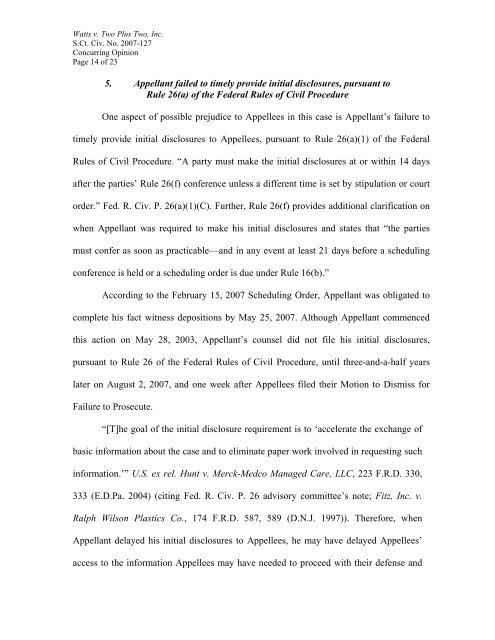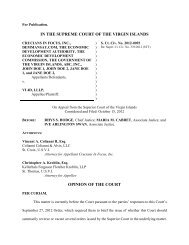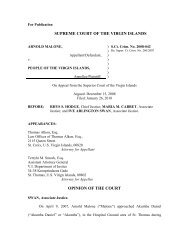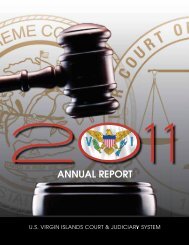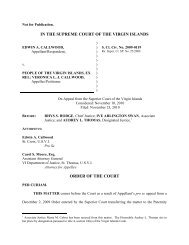IN THE SUPREME COURT OF THE VIRGIN ISLANDS OPINION OF ...
IN THE SUPREME COURT OF THE VIRGIN ISLANDS OPINION OF ...
IN THE SUPREME COURT OF THE VIRGIN ISLANDS OPINION OF ...
You also want an ePaper? Increase the reach of your titles
YUMPU automatically turns print PDFs into web optimized ePapers that Google loves.
Watts v. Two Plus Two, Inc.S.Ct. Civ. No. 2007-127Concurring OpinionPage 14 of 235. Appellant failed to timely provide initial disclosures, pursuant toRule 26(a) of the Federal Rules of Civil ProcedureOne aspect of possible prejudice to Appellees in this case is Appellant’s failure totimely provide initial disclosures to Appellees, pursuant to Rule 26(a)(1) of the FederalRules of Civil Procedure. “A party must make the initial disclosures at or within 14 daysafter the parties’ Rule 26(f) conference unless a different time is set by stipulation or courtorder.” Fed. R. Civ. P. 26(a)(1)(C). Further, Rule 26(f) provides additional clarification onwhen Appellant was required to make his initial disclosures and states that “the partiesmust confer as soon as practicable—and in any event at least 21 days before a schedulingconference is held or a scheduling order is due under Rule 16(b).”According to the February 15, 2007 Scheduling Order, Appellant was obligated tocomplete his fact witness depositions by May 25, 2007. Although Appellant commencedthis action on May 28, 2003, Appellant’s counsel did not file his initial disclosures,pursuant to Rule 26 of the Federal Rules of Civil Procedure, until three-and-a-half yearslater on August 2, 2007, and one week after Appellees filed their Motion to Dismiss forFailure to Prosecute.“[T]he goal of the initial disclosure requirement is to ‘accelerate the exchange ofbasic information about the case and to eliminate paper work involved in requesting suchinformation.’” U.S. ex rel. Hunt v. Merck-Medco Managed Care, LLC, 223 F.R.D. 330,333 (E.D.Pa. 2004) (citing Fed. R. Civ. P. 26 advisory committee’s note; Fitz, Inc. v.Ralph Wilson Plastics Co., 174 F.R.D. 587, 589 (D.N.J. 1997)). Therefore, whenAppellant delayed his initial disclosures to Appellees, he may have delayed Appellees’access to the information Appellees may have needed to proceed with their defense and


